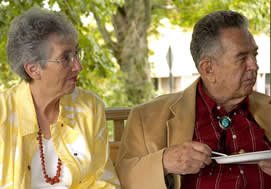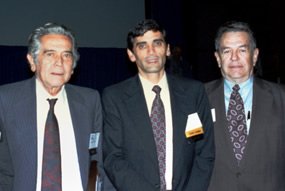A Legacy of Learning
Geologist Carlos Dengo ’76 honors memory of teacher, friend, John Prucha

Almost everybody remembers “the college roommate.” But when that person happens to teach at the university you attend, you’re apt to have more than a few memories. Such was the fate of Costa Rica native Carlos A. Dengo ’76, whose living arrangement with Syracuse University geologist John James Prucha spawned a lifelong friendship.
Our story unfolds in the fall of 1972, when Carlos enrolled at SU as an undergraduate studying geology. His father, Gabriel, was a prominent Central American geologist and a close friend of Prucha’s. When Carlos needed a place to live, the professor intervened. “Why don’t you send him up to us,” he instructed Gabriel. Never mind that Prucha had 10 children, eight of whom still lived at home. “I looked to them as family,” says Carlos, speaking by phone from his home in Houston.
Carlos lived with the Pruchas during his freshman year and used every opportunity to soak up information from John, who became his friend and mentor. “We talked about everything, including geology. In hindsight, many of these conversations were life-forming,” says Carlos, who retired this past summer from ExxonMobil’s Upstream Research Company, where he had served as vice president of geoscience. “Even after I graduated and a lot of time elapsed between our meetings, we would pick up the conversation naturally, as if we had met the day before.”
All that changed this past October, when Prucha died peacefully in his Syracuse home at age 88. His passing—almost 40 years to the week after Carlos turned up on his doorstep—left a tremendous void. The loss was magnified by the death of Prucha’s wife, Mary, two weeks later. “I had a special relationship with John and his family,” Carlos wrote in an e-mail shortly after John’s death. “He was one of the most influential people in my life. I really miss him."

After Princeton, Gabriel relocated to Central America, while Prucha remained in the United States. He briefly taught at Rutgers, before working as a senior geologist with the New York State Geological Survey and then as a research geologist for the Shell Development Company in Houston. At Shell, Prucha was part of a team of experts in structural geology and rock mechanics--some would argue the finest in the world.
When Shell closed that office in 1962, Prucha flirted with the idea of joining some of his co-workers at Texas A&M University, which was forming the Center for Tectonophysics. Instead, he returned to New York State. By then, Prucha was considered one of the nation’s leading structural geologists. He joined the SU faculty in 1963 as a professor of geology and was named department chair later that year. Prucha held that post until 1970, when he began the second act of his SU career as dean of The College of Arts and Sciences. In 1972, Prucha was promoted to vice chancellor, not returning to the faculty until 1985. He spent the balance of the decade teaching and working in the field.
“John was a broad-thinking scholar,” says Jeff Karson, the Jesse Page Heroy Professor and chair of the Department of Earth Sciences (nee Geology) at SU. “His interests spanned an exceptionally wide range of topics in the geosciences that he pursued aggressively. In particular, John had a terrific perspective on economic geology [i.e., the study of how geologic deposits may be used for economic purposes]. He also taught and hired numerous students and colleagues, many of whom went on to make major contributions to geoscience and other related fields.”
One of them was Ellen Metzger G’80, G’84, now a visiting scholar at Stanford University, as well as professor and co-director of the Bay Area Earth Science Institute at San Jose State University. She says her trips with Prucha to the Rocky Mountains were among the highlights of her SU training. “His seminars were excellent preparation for the excursions, and the extensive reading and discussion helped me hone my communication skills and ability to synthesize ideas from the primary literature,” she says. “His classes helped me transition from graduate student to professional geologist. They were invaluable learning experiences.”
Metzger also recalls Prucha’s “dry sense of humor and generosity of spirit,” which, on the road, helped morale. “John was famous for finding cheap lodging for the night,” she says, noting that was no small feat for a vanload of weary geology students. “He’d look for pink signs that touted the availability of hot water and color TV.”
Cathryn Newton, dean emerita of The College, as well as professor of Earth sciences and interdisciplinary sciences underscores the force of his mentoring. At a memorial tribute for the Pruchas, she spoke of John’s passion for teaching and research: “Generations of alumni and colleagues credit his field courses and mentoring as the critical ingredient in their success. Few will ever forget the image of John charging forward in the field, while they struggled to keep up.”
Going from educator to administrator came easily to Prucha. On the heels of the Kent State shootings (which triggered student protests all over the country, including ones at SU), he accepted the deanship of The College. Prucha wasted no time in changing The College’s name from “Liberal Arts” to “Arts and Sciences,” while consolidating the biology department and hiring more scholar-teachers in the humanities.
Prucha’s exploits as vice chancellor were equally impressive. He oversaw construction of the Carrier Dome; bolstered SU’s national and international research efforts; and galvanized the University’s art collections, at one point donating some of his own collection of Southwest American art. “His impact on SU still reverberates today and will continue to be felt by generations of alumni and colleagues,” says SU Chancellor Nancy Cantor.
Meanwhile, Gabriel Dengo continued making a name for himself in Central America. His involvement with the construction of the Venezuela’s Caracas-La Guaira Highway, in the 1950s, earned him the honor of the “greatest geologist in the world.” He would go on to hold key positions with the Union Oil Company of California; Organization of American States; and the Central American Institute for Research and Industrial Technology, which spearheaded industrial development and economic integration throughout five countries.
The Dengo family eventually settled in Guatemala City, where Carlos and his two brothers enjoyed an intellectual flowering of sorts. In addition to their mother, who was a philosophy professor, their grandfather (Gabriel’s father) was a distinguished writer, poet, and teacher, as well as one of Costa Rica’s foremost educators. Their grandmother (Gabriel’s mother) was that country's first elected congresswomen. Carlos almost seemed destined to follow in his father’s footsteps. “In some respects, he is a lot like his father,” Prucha said last summer. “I’d say that Carlos is brilliant—an avid reader and an intense worker who has risen through the ranks of the organization [ExxonMobil]. Another characteristic of both men is their good sense of humor. Carlos has a repertoire of jokes.”
Carlos not only witnessed Prucha’s tremendous work ethic, but also benefitted from it. He was among the first students to inhabit SU’s William B. Heroy Geology Laboratory, which opened in 1972. Named for the great petroleum geologist and SU alumnus, the 65,000-square-foot Heroy building was state of the art in its day. It was climate controlled, and housed offices, labs, storage units, a 200-seat lecture hall, and a research library.
Prucha also instilled in Carlos an appreciation for philanthropy. The John James Prucha Field Research Fund, established in 1992 to support graduate and undergraduate students, was part of the inspiration behind Carlos’s gift to The College two years ago: an endowed fund in John’s name to support junior faculty research in the Earth sciences. “The right thing [to do] was to name it after John Prucha, who had done so much for me,” he says.
Currently, Carlos is co-chairing with C. Page Chamberlain ’79, professor of environmental Earth system science at Stanford University, a campaign to support new facilities in Heroy. “Our goal is to transform Heroy into a visible campus landmark that better meets the needs of today’s researchers and students,” says Carlos. “We need to build on the great work the department has done with the construction of ‘clean rooms and laboratories,’ as well as the recent installation of a large, illuminated globe in the lobby. Contemporary technology will enable us to enhance the building that John brought to fruition 40 years ago.”
Just as Prucha kept reinventing himself—after retiring from SU in 1990, he worked as a consultant, published a book about Wisconsin history, and served on multiple boards—so has Carlos. He is particularly grateful for the opportunity to work alongside Chamberlain on a campaign that will keep the department on the cutting edge. “Many prestigious universities take on a theme and then hire faculty accordingly,” says Carlos, adding that energy institutes are particularly hot right now. “Regardless of the direction in which SU goes, we should never lose sight of providing a quality education and staying true to the core values fundamental underpinnings of the geosciences. That’s what John always stood for and would have wanted."
To support the Earth sciences department, contact Karen Weiss Jones at 315-443-2028 or kmweissj@syr.edu, or visit thecollege.syr.edu, and click on Giving under Alumni & Friends.
Media Contact
Rob Enslin
